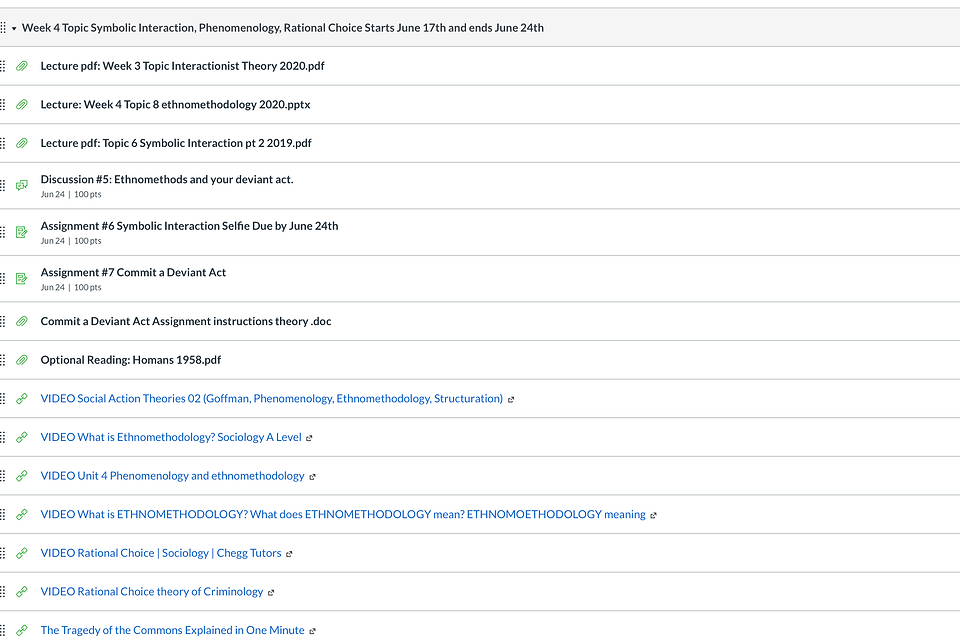Week #4 Phenomenology, Symbolic Interaction & Rational Choice Theory
Week #4 explores "Interactionist" Theories. This week will examine symbolic Interaction Phenomenology, Social Psychology and Ethnomethodology. This final week will bring us almost full circle. These last theories see humans as rational actors, communicators and symbol users and social creators.. These theorist believe that we create the social world through interactions, social definitions, and the internalization of norms or roles. The readings will touch on the work of William James, Herbert Blumer, Charles Horton Cooley, George Herbert Mead, Erving Goffman (Dramaturgy) Howard Garfinkel.


What is good art? Why do we understand the meaning behind these emoji's?
Readings
-
Reading: Wallace and Wolf Chapter 5 Symbolic Interaction
-
Reading: Walace and Wolf Chapter 6
-
Reading: Wallace and Wolf Chapter 7
-
Goffman Summary: https://web.csulb.edu/~hmarlowe/SOC335/Goffman_Dramaturgical_Model.pdf
Assignments
-
Assignment #6: Symbolic Interaction Selfie Powerpoint (100 points)
-
Assignment #7: Commit a deviant act. Breach a simple folkway. (Conduct your own breeching experiment. Full instructions posted to canvas. 3-5 page paper.
Discussion Questions
Discussion Question #5: Briefly tell the class about your act of deviance. How did you feel about breeching a social norm and how did people react to you? Would you do it again? Many in this class are in law enforcement how did it feel to be purposefully deviant? Do Not break any laws or do anything that could jeopardize your job or family. Those types of things are not simple folkways. Further do you think deviants are rational actors? Do you agree with the basic ideas of these theoretical perspectives? Do you think people make decisions about cost or rewards for all of their actions?
Conduct Your Own Breaching Experiment
Commit a Deviant Act - Break a simple folkway!
Command College and Criminal Justice students it is very important to understand why YOU think people become deviant. Why do 'criminals" commit crimes? Your answer to this question is going to have a great deal of impact on how you approach each situation.
Have some fun and see how hard it is for you to be deviant. Do not break any laws or do anything that could bring formal legal sanctions
Symbolic Interaction Selfie

This assignment #6 ask you to apply the terms of these week #4 theories to your real life. Who are you? Who influenced who you are today? What symbols are important to you? What major roles do you play and are there any roles where you have role strain or conflict? How do you think others see you? Give some examples of the difference between some of your front stage and back stage behaviors. Are they particular relationships that have certain rewards or cost to you? (100 points - ppt, full instructions posted to canvas.) Assignment Instructions
Videos
These theories address the following questions.
-
How do people make sense of the social world?
-
How do we learn how to act in particular settings?
-
How do we communicate with each other?
-
How do we present ourselves in public.
-
What variables do we consider before we interact with others?
-
What happenes if we act outside of the expected norms?
Extra Credit
For Mead what is the difference between the "I" and "Me"? Which one would most likely run naked on the beach? (10 points) Post the the extra credit slot in canvas.

I

Me
Screenshot of canvas week #4 requirements.
Here is the screenshot of the canvas requirements for your last week. Please note that there are several recommended video links for week 4. (More than included on the website) Phenomenology and Ethnomethodology are often difficult to understand so these videos will be useful in in explaining the concepts in more detail.

